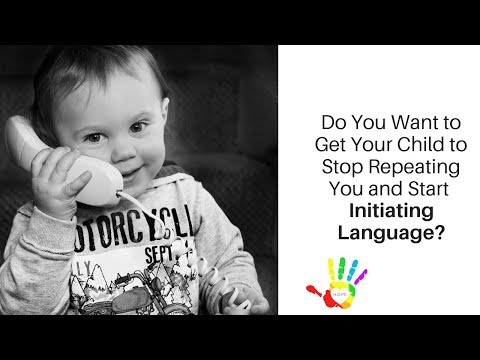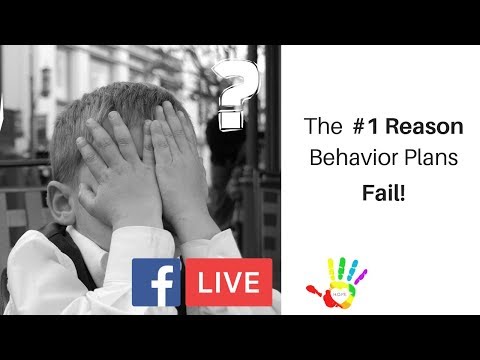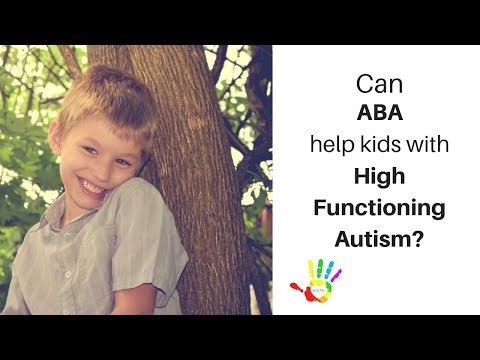I am so excited to post this video because it is the question I was asked the most when surveying what would assist parents you like the most! Are you frustrated that your child just keeps repeating you? They can talk but rather than answering questions they are just repeating what you say! While this can be a difficult problem to solve, there is something you can do to make it a lot easier. I am happy to explain it is in this three minute tip!
Photo: Morguefile
Sound effect: Incomputek
Intro: Graeme Kan
Video Production: Highlander Productions
Disclaimer:
This video is intended for information purposes only. It is not intended to diagnose or treat any medical condition. The text, graphics, images, flash movies, and audio segments are not intended to be a substitute for professional medical advice, diagnosis, or treatment. Always seek the advice of your physician or other qualified health provider with any questions you may have regarding a medical condition.
The information contained in this segment is generalized. It may not be applicable in every situation. Before applying specific interventions, consult a behaviorist. Any behavior intervention can result in an undesired change in behavior if not implemented correctly. No client relationship is established as a result of watching these videos. Jessica Leichtweisz and Hope Education cannot be held responsible for any misuse of the information contained in these videos.
Category
Category
Education
License
Standard YouTube License <br> <h3>Auto Generated Captions</h3>
[Music]
hi guys and welcome back my name is
Jessica likewise founder and CEO of hope
education services every week I post at
least one video answering questions from
other practitioners or parents or
teachers about autism and ABA
so today I’m gonna cover a topic that it
was actually asked by three different
people in the same day so I knew it had
to be a topic that I covered and that’s
how to reduce echolalia in a child with
autism
so in epithelia refers to repeating
speech in Skinner’s theory and Eva’s
verbal operants it’s one of the verbal
operands so there’s there’s really two
things that could be echolalia 1 or
refer to commonly as echolalia one would
be scripting which is where children are
repeating the lyrics to songs repeating
parts of movie scenes they’ve heard
that’s not what I’m referring to what
I’m referring to is when a child repeats
what you said so for example if I say
what’s your name rather than giving his
name he says what’s your name or if I
held up a card and said what color is it
he would say color rather than answering
blue in this case so one of the fast
radishes I found for reducing echolalia
is to teach what’s called inter verbal
so intervals is another verbal operant
it actually is typically learned after
echoic switch is the name of the verbal
operand of echolalia that’s when someone
repeats what you say and the way that
another term for introvert will is a
fill-in so that’s a really great
strategy for reducing echolalia rather
than asking questions or having a child
repeat oftentimes as a prompt is to
using a fill-in so for example I might
start singing twinkle twinkle little
star and pause and expect a child to
fill in star so here’s another example
so let’s say that I’m pushing the child
on the swing and all of a sudden I hold
the swing and say ready set and then
wait and the
child say go so I use intervals a lot
when I’m teaching I find it to be a
really really effective strategy
especially for learners who are
repeating things all the time now listen
it’s good in a degree that they’re
repeating things often times when
children are first learning to talk
that’s what they start doing they hear
what you’re saying and they’re starting
to show they have an understanding of
the fact that they’re supposed to say
something but they haven’t quite figured
out yet that they’re how to change the
speech so they’re just repeating what
you’re saying oftentimes therapists are
using echoic prompts so they’re telling
a child what to say so in the beginning
it can be really really common
try using intervertebral as verbal
fill-ins again is another colloquial
term for that it’s a really effective
strategy and I found it has helped many
many of the children I work with start
to initiate their own spontaneous
language and stop or only repeating what
you have to say so I hope that had
helped if you have any other questions I
love to get them and I’d love to answer
them just email me at Jessica at Jessica
likewise calm and don’t forget to
subscribe to our video and check out all
the other videos on our channel we post
at least one video every single week
[Music]
you
you
Do You Want to Get Your Child to Stop Repeating You and Start Initiating Language? T_BaZxDoUm0
[Music]
hi guys and welcome back my name is
Jessica likewise founder and CEO of hope
education services every week I post at
least one video answering questions from
other practitioners or parents or
teachers about autism and ABA
so today I’m gonna cover a topic that it
was actually asked by three different
people in the same day so I knew it had
to be a topic that I covered and that’s
how to reduce echolalia in a child with
autism
so in epithelia refers to repeating
speech in Skinner’s theory and Eva’s
verbal operants it’s one of the verbal
operands so there’s there’s really two
things that could be echolalia 1 or
refer to commonly as echolalia one would
be scripting which is where children are
repeating the lyrics to songs repeating
parts of movie scenes they’ve heard
that’s not what I’m referring to what
I’m referring to is when a child repeats
what you said so for example if I say
what’s your name rather than giving his
name he says what’s your name or if I
held up a card and said what color is it
he would say color rather than answering
blue in this case so one of the fast
radishes I found for reducing echolalia
is to teach what’s called inter verbal
so intervals is another verbal operant
it actually is typically learned after
echoic switch is the name of the verbal
operand of echolalia that’s when someone
repeats what you say and the way that
another term for introvert will is a
fill-in so that’s a really great
strategy for reducing echolalia rather
than asking questions or having a child
repeat oftentimes as a prompt is to
using a fill-in so for example I might
start singing twinkle twinkle little
star and pause and expect a child to
fill in star so here’s another example
so let’s say that I’m pushing the child
on the swing and all of a sudden I hold
the swing and say ready set and then
wait and the
child say go so I use intervals a lot
when I’m teaching I find it to be a
really really effective strategy
especially for learners who are
repeating things all the time now listen
it’s good in a degree that they’re
repeating things often times when
children are first learning to talk
that’s what they start doing they hear
what you’re saying and they’re starting
to show they have an understanding of
the fact that they’re supposed to say
something but they haven’t quite figured
out yet that they’re how to change the
speech so they’re just repeating what
you’re saying oftentimes therapists are
using echoic prompts so they’re telling
a child what to say so in the beginning
it can be really really common
try using intervertebral as verbal
fill-ins again is another colloquial
term for that it’s a really effective
strategy and I found it has helped many
many of the children I work with start
to initiate their own spontaneous
language and stop or only repeating what
you have to say so I hope that had
helped if you have any other questions I
love to get them and I’d love to answer
them just email me at Jessica at Jessica
likewise calm and don’t forget to
subscribe to our video and check out all
the other videos on our channel we post
at least one video every single week
[Music]
you
you
https://i.ytimg.com/vi/T_BaZxDoUm0/hqdefault.jpg Echolalia,Repetitive speech,intraverbals,speech therapy,aba,verbal operants,behavior analysis,applied behaviour analysis,applied behavior analysis,autism,special education,aparaxia,special needs,education videos,jessica leichtweisz,hope education services I am so excited to post this video because it is the question I was asked the most when surveying what would assist parents you like the most! Are you frustrated that your child just keeps repeating you? They can talk but rather than answering questions they are just repeating what you say! While this can be a difficult problem to solve, there is something you can do to make it a lot easier. I am happy to explain it is in this three minute tip!
Photo: Morguefile
Sound effect: Incomputek
Intro: Graeme Kan
Video Production: Highlander Productions
Disclaimer:
This video is intended for information purposes only. It is not intended to diagnose or treat any medical condition. The text, graphics, images, flash movies, and audio segments are not intended to be a substitute for professional medical advice, diagnosis, or treatment. Always seek the advice of your physician or other qualified health provider with any questions you may have regarding a medical condition.
The information contained in this segment is generalized. It may not be applicable in every situation. Before applying specific interventions, consult a behaviorist. Any behavior intervention can result in an undesired change in behavior if not implemented correctly. No client relationship is established as a result of watching these videos. Jessica Leichtweisz and Hope Education cannot be held responsible for any misuse of the information contained in these videos.
Category
Category
Education
License
Standard YouTube License



